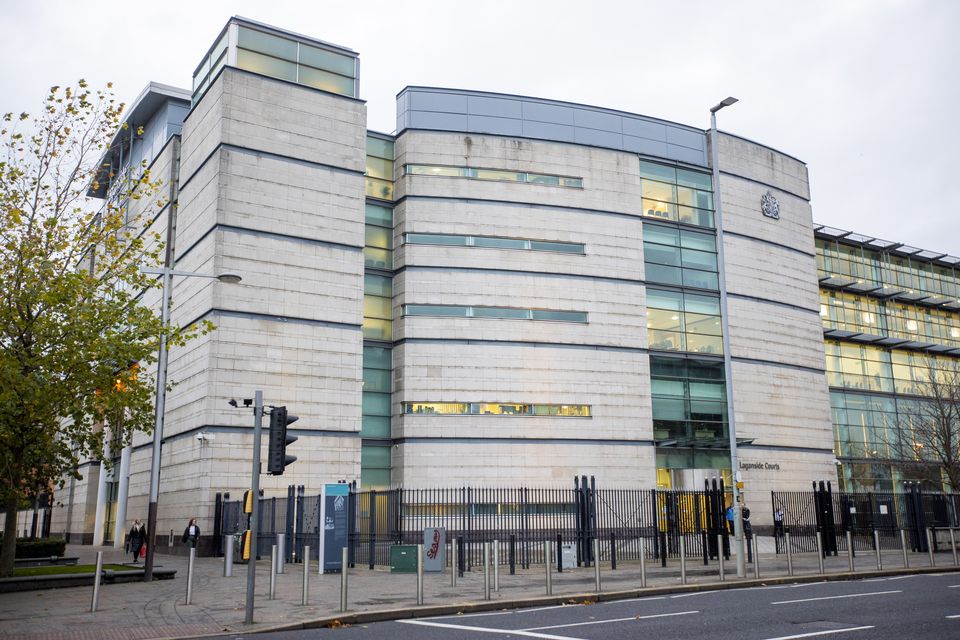The death of a baby boy who suffered severe brain damage during his birth in a Northern Ireland hospital was avoidable, a coroner has found.
Coroner Maria Dougan said there was a “number of missed opportunities” in the care and treatment of baby Troy Brady in 2016.
She has recommended that all hospitals should now develop a protocol regarding receiving informed consent from parents during high-risk births.
Troy was born in the maternity unit at Craigavon Area Hospital on August 19 2016. He died in the hospital’s paediatric intensive care unit six days later.
His inquest heard that he had been born with with severe head injuries, with a lack of blood and oxygen to the brain.
The inquest findings were delivered at Laganside Courthouse in Belfast (Liam McBurney/PA)
The infant’s mother, Jane Brady, from Coalisland went into labour at 33 weeks while Troy was lying breech.
Despite the breech position, Mrs Brady and her husband John said doctors in the maternity unit recommended a natural birth.
The inquest heard that consultant Dr Rohit Sharma had begun the delivery with Mrs Troy in the all-fours position, but later moved her onto her back.
Delivering her findings, Ms Dougan said: “I find on the balance of probabilities, had appropriate documented counselling been given to, and informed consent obtained from, Mrs Brady and the deceased delivered by Caesarean section, had the vaginal breech delivery been conducted in the delivery team’s most familiar position, lithotomy, from the outset to avoid the delay in the change of position from all-fours, the deceased’s death on the 25th August 2016 in Craigavon Area Hospital was avoidable.
“On the evidence before me, there were a number of missed opportunities in the care and treatment of the deceased.”
The coroner said that the birth had been high risk and that the mother should have been informed of this.
She said there had been an “emphasis” placed on a natural birth by doctors.
She said: “Therefore, I find that Mr and Mrs Brady did not provide fully informed consent for a pre-term vaginal breech delivery.
“I find that had Mrs Brady been properly consented she would have, on her own evidence, opted for a Caesarean section.”
The coroner added: “I find all trusts should give consideration to issuing a protocol or guidance in addition to the aide memoire which would provide detailed information on consent for high-risk situations like this before reaching the labour ward, which would ensure that clinicians and patients were clear that all the information had been given and understood.”
Ms Dougan said an all-fours vaginal breech delivery was “not a common practice in pre-term high-risk pregnancies such as Mrs Brady’s”.
She added: “I find that Dr Sharma lacked the requisite experience and confidence at that time to perform a pre-term vaginal breech delivery in all-fours position, with a team inexperienced in this position for breech deliveries and in a hospital where it had never been performed before.
“I find that Dr Sharma, who was appointed to the role of consultant six weeks prior, was attempting an unconventional technique for Craigavon Area Hospital in a potentially difficult breech birth and should have called a more senior consultant.”
The coroner said the necessity to move Mrs Brady during the birth had “created uncertainty and confusion in the delivery room”.
She said: “I find that Dr Sharma should have conducted the deceased’s delivery in the lithotomy position from the outset as he was, by his own acknowledgement, not trained to conduct manoeuvres in the all-fours position.”
The coroner said it had been a complex and difficult inquest and relayed her sympathies to the parents.
A representative of the Southern Trust extended condolences to the family in court at the end of the hearing.
